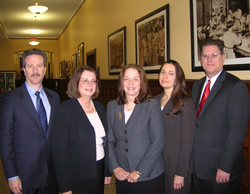CEO&I: Offering Some Real "I" to CEO's
When Ann Armstrong arrived at TC in the fall as the new head of the Center for Educational Outreach and Innovation (CEO&I), her goal was the obvious one: to step up performance for an organization that was originally aimed-'"but hasn't always been successful-'"at creating alternative revenue streams for the College. But with 25 years spent delivering education and learning solutions to corporate America, Armstrong came with a strategy for realizing that goal that was entirely new: to put together programs that help corporations meet multiple needs and deliver them through TC's infrastructure.
When Ann Armstrong arrived at TC in the fall as the new head of the Center for Educational Outreach and Innovation (CEO&I), her goal was the obvious one: to step up performance for an organization that was originally aimed- but hasn't always been successful- at creating alternative revenue streams for the College. But with 25 years spent delivering education and learning solutions to corporate America, Armstrong came with a strategy for realizing that goal that was entirely new: to put together programs that help corporations meet multiple needs and deliver them through TC's infrastructure.
She hasn't wasted much time in making that happen. For starters, CEO&I has hired three business development directors who will be "laser-focused" on calling on corporate America, large-scale school districts and potential partner organizations to garner revenue for the College. But it's what the new team will be selling that's especially exciting. In one new program, CEO&I will enable companies such as Met Life and Bank of America to partly pay for training of employees by funding scholarships for New York City teachers and principals who want to improve their practice. The training provided will not only be in traditional areas such as leadership development, but also in instructional design and development of online learning technology programs and even in more rarified areas such as the skills needed for corporate acquisitions and mergers. (The latter effort will be conducted with the aid of TC's International Center for Conflict Resolution).
"We want to be active in areas that directly help corporations improve their bottom line," Armstrong says.
The arrangement will also enable financial services companies to meet their mandated community service requirements while at the same time helping America's teachers and principals. Specifically, for open enrollment programs that flow through CEO&I, such as the new Professional Certificate programs, a portion of the funds will be allocated to enable teachers to pursue professional development. The teachers chosen will hail from within TC's network of collaborations with New York City public schools in Harlem and other under-served areas.
"This strategy is a win for everyone involved," Armstrong says.
To create the program, Armstrong and her team have been meeting with senior human resource learning executives from Met Life about developing instructional design for both Web-based learning and face-to-face instruction through a New Managers Academy based on New York City's successful New Principals Academy. TC faculty members Craig Richards, Victoria Marsick, Lyle Yorks, Terry Maltbia and others from the Department of Organization and Leadership, along with Chuck Kinzer and John Black from the Department of Mathematics, Science and Technology and staff from the Gottesman Libraries, will work with the corporations. Met Life is also interested in having TC Mathematics, Science and Technology students and Adult Learning students design and develop technology-based instructional programs.
With 70 percent of the nation's Fortune 500 corporations headquartered in the tri-state area, the Met Life deal could be the first of many for CEO&I. But Armstrong's focus isn't just on corporations. CEO&I also will work with the National Education Association (NEA) on professional development certificate programs for teachers and principals through online courses. The basis for this effort is CEO&I's own new certificate program for educational professionals.
"If you don't want to commit 32 credit hours for a master's degree, we have created certificate programs that can be obtained online, on campus or through a combination of both," Armstrong says.
Indeed, for students around the country who cannot come to 120th Street, an online TC master's degree will soon be a reality. The College's first master's degree program in technology and education is being developed by adjunct associate professor Howie Budin and should begin by 2007. The ideal will be to create coursework that is highly structured and then train TC students to teach that material under the mentorship of their professors. The faculty who develop the courses will receive royalties. Following Budin's online program, CEO&I hopes to launch programs through the leadership of Marsick, Yorks and Maltbia that are targeted at online degrees in Adult Learning and Leadership.
Still another program in the works will enable social workers, psychologists and other professionals to acquire continuing education units each year via courses on the Web. Participants will be able to work on their own and self-test without the involvement of the course's faculty designer. Faculty designers who create course templates would also receive royalties each time someone signs up for the course.
Longer term, Armstrong and her staff envision giving teachers around the country the opportunity to open their own "franchises" of the New Teacher Academy model developed through TC Innovations, which has improved new teacher retention everywhere it has been implemented. The benefits for TC, beyond the added revenue: reaching thousands of additional teachers, and providing revenue for those who have retired or are seeking new ways to use their skills.
"They know people in the school district and they have teaching credentials, and we have the program, along with the ability to train them to use it," Armstrong says. "This opportunity gives teachers the ability to have a nice business in their home town in an area in which they have core competency while providing new teachers with the community and tools they need to be successful in their new job."
Published Thursday, Feb. 23, 2006
